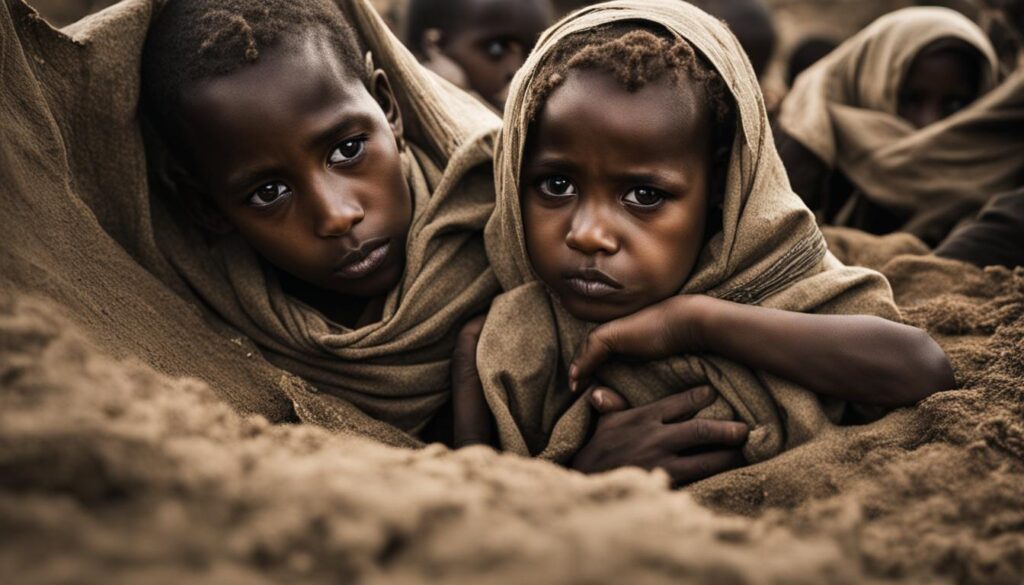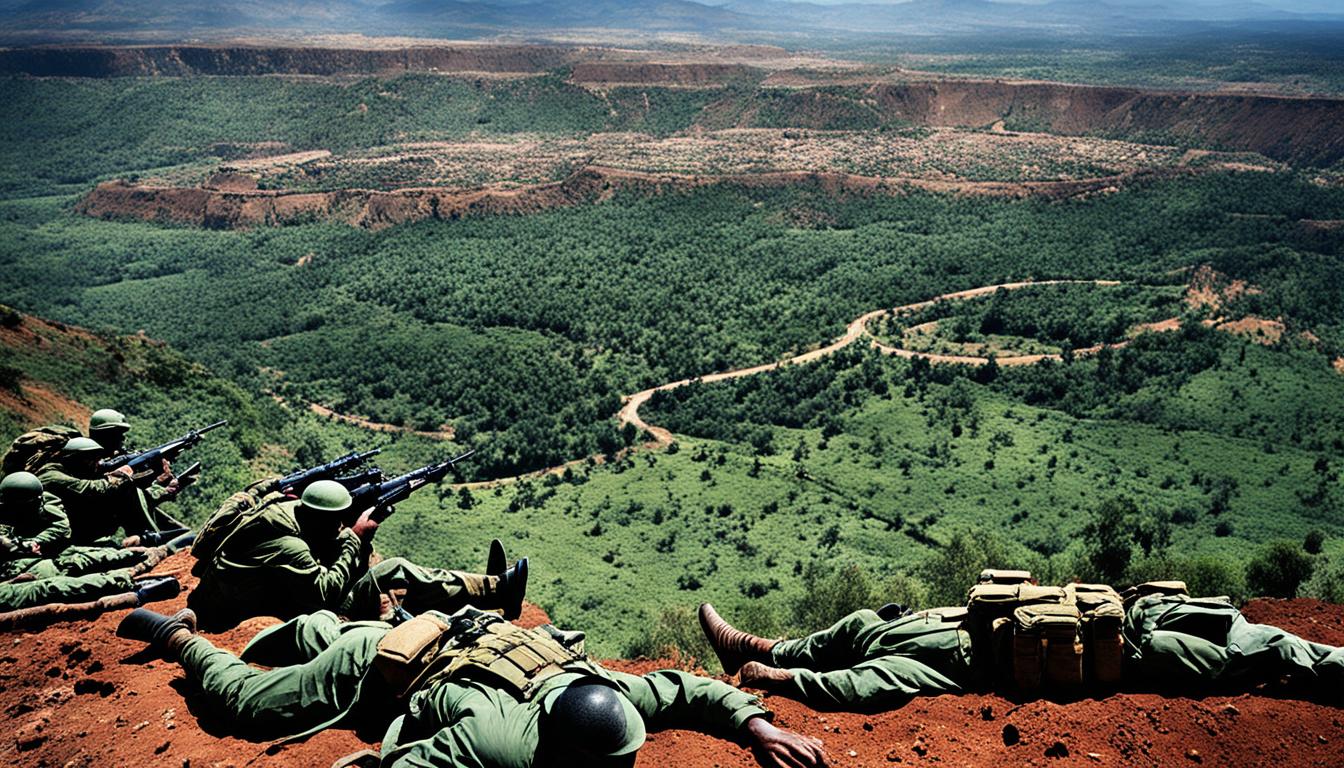Is Ethiopia at War?
Did you know that Ethiopia is currently grappling with a violent internal conflict in addition to the aftermath of the Tigray War? The country is facing another wave of unrest, this time in the Amhara and Oromia regions. This unexpected escalation has raised concerns about the stability and current situation in Ethiopia.
Key Takeaways:
- Ethiopia is experiencing a violent internal conflict in the regions of Amhara and Oromia.
- The conflict involves militia groups and regional security forces, including former allies and enemies of the government.
- The ongoing conflict raises concerns about the stability and current situation in Ethiopia.
- The conflict has led to a humanitarian crisis, internal displacement, and a severe strain on the country’s economy.
- Prime Minister Abiy Ahmed faces challenges in navigating the conflict and bringing about stability and reconciliation.
Background of the Conflict in Ethiopia
The conflict in Ethiopia has a complex background rooted in historical and political factors. One significant event that served as a catalyst for the current situation was the Tigray War, which took place from 2020 to 2022. The war involved the Tigrayan People’s Liberation Front (TPLF), a dominant political force in Ethiopia before Prime Minister Abiy Ahmed came to power. The Tigray War resulted in devastation and allegations of war crimes and ethnic cleansing in the Tigray region.
Furthermore, the conflict strained Ethiopia’s relations with Eritrea. Prior to the Tigray War, Ethiopia and Eritrea had a long history of hostility, including a bloody border war in the late 1990s known as the Ethiopia-Eritrea War. However, in a surprising turn of events, Prime Minister Abiy Ahmed reconciled with Eritrea and established diplomatic ties in 2018. This reconciliation effort was widely hailed as a positive step towards regional peace and stability.
“The Tigray War and its aftermath have revealed deep-seated ethnic tensions and divisions within Ethiopian society.”
The Tigray War ended in November 2022, but its repercussions are far from over. The conflict left Tigray in ruins and ignited ethnic violence in other parts of the country. It also raised questions about the future of the Tigrayan people and their political representation in Ethiopia.
The conflict in Ethiopia is not solely a clash between political factions; it reflects deep-rooted historical, social, and cultural factors that have contributed to ethnic tensions. Resolving the conflict requires addressing these underlying grievances and finding a path towards lasting peace and national reconciliation.
Recent Developments in the Conflict

In recent times, the ongoing conflict in Ethiopia has witnessed significant developments, including an insurgency in the Amhara region. Previously, the Amhara militias had fought alongside federal troops in the Tigray War. However, after a ceasefire was reached with the Tigray People’s Liberation Front (TPLF), these militias turned against the government, sparking an Amhara insurgency.
This insurgency has resulted in clashes in major cities and poses a significant challenge to Prime Minister Abiy Ahmed’s government. The Amhara militias, once allies, have become a source of internal conflict, adding further complexity to the situation. Despite attempts at peace talks and negotiations, a resolution has yet to be achieved.
This ongoing conflict has led to a highly volatile situation in Ethiopia. The unrest in the Amhara region adds to the already complex web of conflicts in the country, including the Tigray War and the Oromo Liberation Army (OLA) insurgency. It is crucial to closely monitor the developments and their impact on the overall stability of Ethiopia.
Challenges and Implications
The continual conflict in Ethiopia raises concerns about the country’s stability and its ability to address the root causes of the unrest. The insurgency in the Amhara region further highlights the complex dynamics between different factions and the government.
“The ongoing conflict in Ethiopia poses significant challenges and requires a comprehensive approach to achieve lasting peace and stability,”
Peace Talks and Negotiations
Efforts to resolve the conflict through peace talks and negotiations have been attempted but have not yet yielded a solution. It is crucial for all parties involved to engage in open dialogue and work towards a peaceful resolution.
- Peace talks should involve representatives from the Amhara militias, the government, and other relevant stakeholders.
- Mediation by neutral parties can play a crucial role in facilitating productive negotiations.
- Ethiopia’s leaders must prioritize diplomatic efforts and explore all possible avenues for reconciliation.
The international community should provide support and encouragement for these peace talks, as a peaceful resolution is in the best interest of Ethiopia and its people.
Impact of the Conflict on Ethiopia

The ongoing conflict in Ethiopia has had severe repercussions on various aspects of the country, leading to a humanitarian crisis, significant loss of life, economic turmoil, and ethnic tensions.
Humanitarian Crisis and Internal Displacement
The conflict has resulted in a dire humanitarian crisis, with millions of Ethiopians internally displaced and in urgent need of food, shelter, and healthcare. The displacement of people from their homes has disrupted communities and put a strain on limited resources, exacerbating the already challenging plight of vulnerable populations.
High Number of Casualties
The Ethiopia conflict has tragically led to a significant loss of lives. Estimates range from 80,000 to 600,000 casualties, highlighting the immense human cost of the ongoing violence and unrest. The loss of lives has left families bereaved and communities shattered, further deepening the impact of the conflict.
Economic Crisis and Strained Economy
The conflict has plunged Ethiopia into an economic crisis, compounding the existing economic challenges the country faces. Infrastructure damage, disruptions to agricultural activities, and the displacement of workers have undermined economic stability, hampering growth and exacerbating poverty levels. The conflict’s toll on the economy further exacerbates the hardships faced by the Ethiopian population.
Ethnic Tensions and Social Divisions
One of the alarming consequences of the conflict in Ethiopia is the exacerbation of ethnic tensions and the creation of social divisions. The conflict has deepened existing ethnic fault lines, pitting different groups against each other and fueling animosity. These tensions not only hinder efforts towards peace and stability but also threaten the social fabric of Ethiopian society.
It is crucial to address the impact of the conflict on Ethiopia, both in terms of providing immediate humanitarian assistance and working towards the resolution of the underlying issues that have led to such devastating consequences.
Challenges for Prime Minister Abiy Ahmed
Prime Minister Abiy Ahmed faces numerous challenges in navigating the conflict in Ethiopia. He has had to deal with uprisings in multiple powerful regions, including Tigray, Oromia, and now Amhara. These crises have posed threats to Ethiopia’s stability and have strained inter-ethnic relations.
One of the key challenges that Prime Minister Abiy Ahmed faces is the need to restore and maintain stability in the country. The conflict has created a volatile situation, with ongoing violence and unrest. Ensuring peace and security is essential for Ethiopia’s development and the well-being of its people.
Interpersonal relations and inter-ethnic tensions have also become major challenges in Ethiopia. The conflict has deepened existing divisions and animosities between different ethnic groups, leading to a further deterioration of trust and unity. Rebuilding inter-ethnic relations and fostering a sense of inclusivity and national unity will be crucial for long-term stability in the country.
Furthermore, Ethiopia is grappling with a deep economic crisis exacerbated by the ongoing conflict. The economy has been severely affected, with disruptions to trade, investment, and essential services. Prime Minister Abiy Ahmed will need to address the economic challenges and implement effective policies to stimulate growth and stabilize the country’s finances.
“Navigating these challenges requires a delicate balancing act and effective leadership,” says Abiy Ahmed. “We are committed to fostering stability, strengthening interpersonal relations, and revitalizing the economy for the betterment of all Ethiopians.”
Prime Minister Abiy Ahmed faces a formidable task in addressing the multifaceted challenges in Ethiopia. It will require strategic decision-making, effective implementation of policies, and a commitment to reconciliation and unity. By overcoming these challenges, Ethiopia can pave the way for a brighter and more prosperous future.
| Challenges | Solutions |
|---|---|
| Ethiopia stability | Effective leadership and peacebuilding initiatives |
| Interpersonal relations | Promotion of dialogue and understanding between ethnic groups |
| Economic crisis | Implementation of policies to stimulate growth and stabilize the economy |
| Inter-ethnic relations | Rebuilding trust and fostering national unity |
Potential Solutions and Reconciliation Efforts
To address the conflict in Ethiopia, we must prioritize peaceful solutions and reconciliation efforts. Prime Minister Abiy Ahmed’s leadership is crucial in facilitating dialogue and peace talks with the armed dissidents in the Amhara region. By engaging in productive discussions and working towards a ceasefire, we can take significant steps towards resolving the conflict.
Furthermore, it is essential to pursue broader national reconciliation efforts that bring together various factions from the Amhara, Tigray, and Oromo regions. This inclusive approach will foster understanding, trust, and the healing of deep-seated divisions. National reconciliation is paramount for lasting peace and stability in Ethiopia.
International mediation and support are also vital in the resolution process. Organizations such as the African Union, the United States, and the European Union should play an active role in facilitating dialogue and encouraging a peaceful resolution. Their involvement can lend credibility to the peace talks, provide resources, and offer neutral facilitation for the negotiation process.
Through a combination of dialogue, national reconciliation efforts, and international mediation, we have the potential to achieve a peaceful resolution to the conflict in Ethiopia. It is imperative that all parties involved commit to the dialogue process and work together towards a sustainable peace that will benefit the Ethiopian people and ensure the country’s long-term stability.
International Involvement and Support for Peace
International involvement and support play a crucial role in facilitating peace in Ethiopia. Various global actors, such as the African Union, the United States, and the European Union, have a responsibility to contribute to the resolution of the ongoing conflict. By actively engaging and providing support for conflict resolution efforts, we can create a conducive environment for peaceful negotiations and encourage a more conciliatory approach from Prime Minister Abiy Ahmed.
The African Union, as a regional organization with a focus on promoting peace and stability in Africa, should take an active role in the peace process. By encouraging dialogue among the conflicting parties and facilitating mediation, the African Union can contribute to finding a peaceful resolution to the conflict. Their intervention can help bridge divides and bring about a more united Ethiopia.
“The engagement of the African Union is essential in resolving the conflict in Ethiopia and ensuring sustainable peace. As African nations, it is our collective responsibility to support Ethiopia in its pursuit of reconciliation and stability.” – African Union Representative
Similarly, international actors, including the United States and the European Union, should actively engage in the peace process. By providing diplomatic support, mediation services, and financial assistance, these actors can assist in creating the necessary conditions for peaceful resolution and encourage all parties involved to embrace dialogue and compromise.
It is important to recognize that the conflict in Ethiopia has far-reaching implications, not only for the region but also for global security and stability. By fully engaging in conflict resolution efforts, international actors can demonstrate their commitment to maintaining peace and supporting the Ethiopian people in their quest for stability and unity.
Conclusion
The conflict in Ethiopia, particularly in the regions of Amhara and Tigray, presents a grave threat to the country’s stability and demands urgent attention. To achieve a peaceful resolution, it is crucial to prioritize dialogue, national reconciliation, and foster inter-ethnic understanding. Prime Minister Abiy Ahmed’s leadership is pivotal in navigating these complex challenges and leading Ethiopia towards a path of peace.
However, this cannot be achieved in isolation. International support and engagement play a vital role in facilitating a peaceful resolution. The African Union, the United States, the European Union, and other key stakeholders should actively participate in the peace process and provide the necessary assistance and resources to support Ethiopia’s efforts.
Resolving the conflict in Ethiopia goes beyond ending the violence; it requires addressing the underlying grievances and fostering long-term stability. With a commitment to national reconciliation and the concerted efforts of both domestic and international actors, Ethiopia can overcome this crisis and create a more peaceful and prosperous future for its people.





